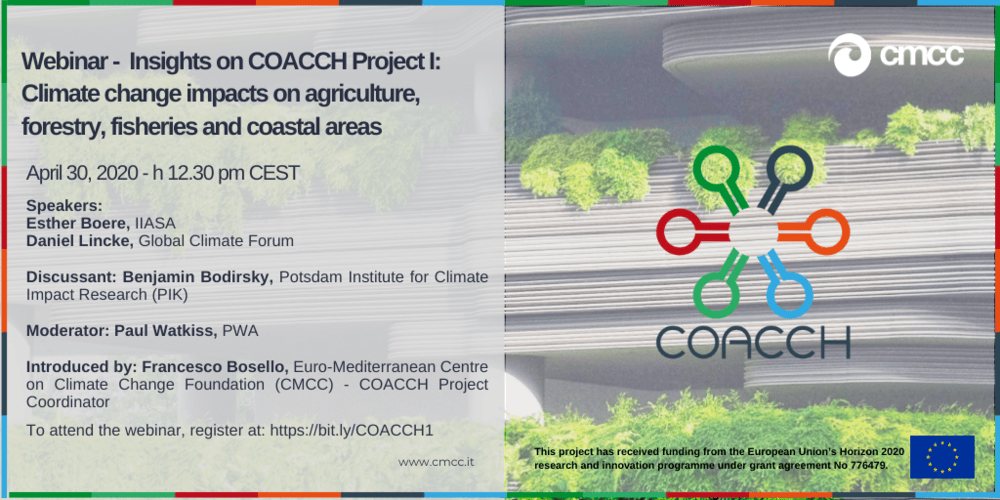COACCH Webinar | 30 April, 2020 – h. 12:30 – 1:30 PM CEST
Introduced by: Francesco Bosello, CMCC Foundation – COACCH Project Coordinator.
Speakers:
Esther Boere, International Institute for Applied Systems Analysis (IIASA), Vienna, Austria.
Daniel Lincke, Global Climate Forum (GCF), Germany.
Discussant: Benjamin Bodirsky, Potsdam Institute for Climate Impact Research (PIK), Potsdam, Germany.
Moderator: Paul Watkiss, Paul Watkiss Associates (PWA), Oxford, UK.
The objectives of the COACCH (CO-designing the Assessment of Climate CHange costs) project is to produce the improved downscaled assessment of the economic costs of climate change in Europe, providing results that are of direct use to end users from the research, business, investment, and policy making community. The project is co-ordinated by Fondazione Centro Euro-Mediterraneo Sui Cambiamenti Climatici (CMCC), Italy and involves 14 European research institutions.
As part of the project, the study is proactively involving stakeholders in co-design, co-production and co-dissemination, to produce research that is of direct use to end users from the research, business, investment and policy making communities. As part of dissemination activities, the COACCH project is organising a series of webinars on emerging results. This is the first in a series of such events, and focuses on sector specific results in a number of key areas,
for agriculture, forestry and fishery as well as infrastructure, built environment, and transport. This presents the results of detailed sectoral modelling results, that have used harmonized climate and socio-economic scenarios, to examine impacts at the European scale
The first presentation in the Webinar will focus on agriculture, forestry and fisheries. Climate change has the potential to affect the agriculture, forestry and fisheries sector, both negatively (e.g. from lower rainfall, increasing variability, extreme heat) and positively (e.g. from CO2 fertilization, extended seasons). This will affect productivity and, in turn, production, consumption, prices, trade and land use. In COACCH, impacts of slow‐onset climate change on agriculture, forestry and fisheries, with a focus on the European Union have been progressed using a broad range of climate models, crop models (EPIC, GEPIC and LPJmL 5), forest models (G4M, FLAM) and living marine resource models. These have then been combined with two bio‐economic models (MAgPIE 4 and GLOBIOM) covering the land use and marine production sectors. The analysis has undertaken sensitivity analysis, to examine the impact of additional factors such as socioeconomic pathways, level of warming, CO2 fertilization, on the results.
This study finds that the magnitude of climate induced yield impacts varies greatly across crops, sectors and areas. In the case of crops cultivated in the EU, climate impacts on winter wheat, oil seeds and sugar crops are of a much lower magnitude compared to impacts on corn. These impacts – in turn – induce large area reallocations for corn and other crops due to changes in relative profitability, resulting in agricultural losses in Southern and Eastern Europe, and gains in Northern and Western Europe. When it comes to forests, two pathways of climate impacts are analyzed: first, the impact on forest increments and harvest potentials, and second, through the enhanced risk of forest fires. The analysis has also considered global and European marine capture fisheries, and projects a global decline in due to climate change, although with strong regional differences. Fisheries near the equator are to be affected more negatively and fish population may migrate to Northern latitudes, where capture fisheries may gain.
The second presentation in the webinar will focus on coastal zones. This has used an updated version of the DIVA model to assess the potential impacts on a range of receptors in Europe from sea level-rise, erosion and storm surges. For infrastructure, built environment, and transport, the study finds that coastal floods could have the biggest impacts on infrastructure in the European Union, if adaptation measures are not continued and intensified. The analysis has considered a range of climate and socio-economic scenarios, including high end global average mean sea-level rise. However, investment into coastal adaptation can lower the potential impacts by several orders of magnitude.
The COACCH project has received funding from the European Union’s Horizon 2020 research and innovation programme under grant agreement No 776479.
About speakers:
Esther Boere is an agricultural economist in the International Institute for Applied Systems Analysis (IIASA) Ecosystem Services and Management (ESM) program. Her research focuses on analysing the driving factors of land use change through short- and long-term responses to climate change and extreme events and regional- and country-level impacts on food security, deforestation and restoration policies. Prior to joining IIASA, Dr Boere received her PhD from Wageningen University on the effect of the European Union’s Common Agricultural Policy reform on land use changes.
Benjamin Leon Bodirsky is an agricultural economist in the landuse group at Potsdam Institute for Climate Impact Research. He is one of the main developers of the open-source land system modelling framework MAgPIE (https://github.com/magpiemodel).
Daniel Lincke is a researcher in the Adaptation and Social Learning process, where he is in charge of the application and further development of the DIVA model for coastal impacts and adaptation. He studied Computer Science at the Friedrich-Schiller-University Jena and graduated in 2003 (Diploma). After working two years in an industrial researched company he became a PhD student at PIK in 2006. After finishing his PhD (supervised at the Technical University Hamburg-Harburg) in 2012 he joined GCF as a scientific programmer. He has also former affiliations with State Key Laboratory of Earth Surface Processes and Resource Ecology (Beijing Normal University) and with the Cluster of Excellence “The Future Ocean” at Christian-Albrechts-Universität zu Kiel (CAU).
Watch the video:
HOW TO PARTICIPATE
The webinar will be broadcasted via Go-to-Webinar.
Please, click on the following link for registration:
https://register.gotowebinar.com/register/8297936595734777100
After registering, you will receive a confirmation email containing information about joining the webinar.
Organized by
The COACCH Project – CO-designing the Assessment of Climate CHange costs


